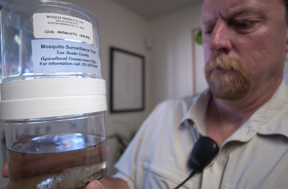
Northern SBC property owners will receive mail ballots in
May
After nearly nine months of surveying and discussion, the San
Benito County Board of Supervisors approved a mail ballot that
could create a permanent mosquito abatement program in the most
populated parts of the county.
Northern SBC property owners will receive mail ballots in May
After nearly nine months of surveying and discussion, the San Benito County Board of Supervisors approved a mail ballot that could create a permanent mosquito abatement program in the most populated parts of the county.
Currently, San Benito is one of the few counties in California that does not have a permanent year-round program to fight the pesty bugs that breed in stagnant water, and haunt residents at dawn and dusk. It is not the itchy bites they leave when they bite humans that have health officials worried, but the illnesses they can spread.
“The [West Nile] virus is here,” said Paul Matulich, San Benito’s agricultural commissioner. “We had two horses and a bird infected.”
For two years, the county has received emergency grants from the state to combat the spread of West Nile virus. The disease has spread in recent years, with 54 counties of 58 counties in California reporting virus cases in mosquitoes, horses, birds or humans. San Benito had only one reported case of an infected bird in 2006.
The disease has mild cold-like symptoms in most people, but can be fatal or paralyzing in a few cases.
Knowing that funds were not likely to be available for 2007-2008, the Board of Supervisors has been discussing alternative ways to fund a permanent program with staff from the Agricultural Commissioner’s office and the Health and Human Services Agency.
“The state money was used to buy equipment to control populations,” Matulich said. “But it wasn’t used to buy traps or for surveillance.”
All the counties surrounding San Benito, including Monterey, Santa Cruz and Santa Clara have long had mosquito control districts in place.
“Salinas has a real good mosquito vector control program that’s been around for 50 years,” Matulich said.
Property owners near Paicines, Tres Pinos, San Juan Bautista, Hollister and Aromas will start receiving the mail-in ballot measure after May 8. Owners of single-family homes would be charged $9.80 for the services, with other assessments for multi-home dwellings and agricultural land.
“It would be a tremendous help,” Matulich said.
If property owners approve the special assessment district, it would be used to offer services that are not provided now or provided in limited amounts.
Through surveillance, staff would be able to monitor populations to keep track of problem spots and to test for diseases. Mosquito control, which includes destroying mosquito larvae before they grow to be adults, is one key component of the program. Mosquito fish that are not dangerous to other animals would be provided for agricultural and natural mosquito breeding grounds as well as ornamental fishponds, free of charge.
Prevention of disease is another goal of the program, which would be done by monitoring mosquito populations year-round.
“West Nile started it, but there a lots of other [diseases] that they carry,” Matulich said. “One vet said they are the worst insect in the world and have killed more people than all the wars in the world.”
While rare in the United States, mosquitoes spread malaria, Dengue and Yellow Fever like wild fire in developing parts of the world. Staff would test mosquitoes year-round for West Nile, Western Equine Encephalitis, dog heartworm and malaria.
In addition to prevention and control, part of the money raised through an assessment district would also be used for community outreach. While the agricultural commission works on control efforts, education would be done through the Health and Human Services Agency, though Matulich offered some tips to residents as mosquito season gets under way.
One problem spot Matulich’s staff has identified are the cups for flowers that are placed in cemeteries at gravestones. As the lawns are watered, the cups fill with water that stagnates.
“Tires, kids play things, buckets and empty flower pots,” Matulich said, listing items people should empty of water regularly. “It doesn’t take much for [mosquitoes] to breed. We’ve found them where cows have stepped and left an indentation that fills up with water.”
The part of the county left out of the ballot measure includes most of South County, an arid region that has few mosquito problems, Matulich said. If the assessment is passed, county staff would still respond to emergency outbreaks of mosquitoes in the areas not included in the assessment district. But the money would come out of the general fund.
Those with questions about the measure, or with concerns about mosquito populations, can contact the San Benito County Agricultural Commissioner at 637-5344. For more information on West Nile Virus, visit http://westnile.ca.gov/.
Proposed annual assessment rates
Single-family homes – $9.80
Apartment dwellings – $5.39 per dwelling unit for the first 20 units, $.98 for each additional unit over 20.
Agricultural properties -$.08 per acre, $.016 per acre of dry pasture and timberlands








